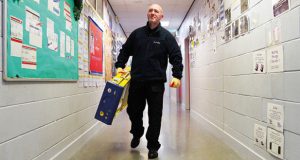Paul Crilly, Managing Director of NJC, talks to Sara Bean about the rationale behind the relocation of its head office to London’s Victoria and what it signifies for the future of the company
NJC(Not Just Cleaning) specialises in providing commercial cleaning and support services including window cleaning, rope access, specialist cleaning, public realm cleaning, waste management and janitorial to mainly blue-chip clients. The company recently made the bold decision to relocate its head office to Central London, retaining a regional support facility in Wokingham, Berkshire.
It’s unusual to hear about any organisation heading into the capital, and even more surprising to find a service company take up residence in such a glamorous location as the Zig Zag building. The development, which is part of Landsec’s £2 billion transformation of London’s Victoria, opened in 2015, and went on to win the best office building at the World Architecture Festival 2016. We sat down with MD Paul Crilly to ask, what prompted such a move when the majority of service suppliers tend to opt for out-of-town locations such as business parks?
The impetus, he says, was deciding to take advantage of building lease breaks to completely rethink its plans. “We had a desire to do something quite different, and once we started on that journey we had a perfect storm of opportunity. Our space in London was pretty basic, and not the best environment for colleagues. The lease in Winnersh was up for renewal, and with 80 per cent of our revenue coming from Greater London customers, we decided there was a compelling reason to be in London, as close as possible to many of our key customers.
“That’s why we decided to switch things around, and have a regional support business, based in Wokingham, while moving our head office to London. We’re really fortunate to have very large contracts, within which the bulk of our workforce is embedded. The head office operates as a support function to them and we need to be as effective as we can be – and simply get smarter.”

Says Crilly: “When you look at office trends at the moment, the likes of WeWork are disrupting the industry and their environments all look and feel like this, so first and foremost we’re trying to reflect the market we work in. The move means that we now look like the customers we’re servicing, as these exposed ceilings and concrete walls are typical of the sort of offices we deal with in our marketplace.
“But we’re also changing the way we work, with, for example, the inclusion of three or four seating types in the new offices, aimed at facilitating collaboration. The new offices offer more group seating than dedicated desks, and there are only three teams now who need fixed desks, which are business support, finance and HR.”
The new offices feature a range of flexible meeting rooms which can be formatted as one larger space for team training or town hall meetings. One of the most popular additions has been a sit-up counter in the centre of the office aimed at flexible workers, which has already attracted operational colleagues into the offices to make use of the space.
Says Crilly: “The change has been fantastic culturally. We pitch ourselves as a responsive, agile company and what we have done here is the next stage of our evolution. We all had a hand in the design and layout of the new space, which is aimed at accommodating three key areas: customers, business support and quiet working, and so far, the most positive aspect is the number of occasions our operational support colleagues come and go. Also, we’ve already had more customers come here in the few weeks we’ve been here than over the three years we were in Winnersh.”
SMART THINKING

“People look at technology as if there’s a problem to be solved, and I’d rather look at what your customer needs and start from a base position,” he explains. “For me, transparency and integrity are everything, so I need to find a way to agree a sum of hours for services. I’ll achieve that as seamlessly as possible through time and attendance technology, where I can demonstrate that we have met the hours agreed, and then through a quality auditing regime I can also tell you the quality of those hours.
“The crucial part of that is how I present that information to the customer, and that is about data – so whatever tech we deploy should give us some information that makes us smarter, which customers can cut and carve in whatever way they want.”
This kind of technology, he argues, can help raise the bar in terms of performance, health and safety and compliance. For example, you might use an automatic measurement to monitor the number of near misses being recorded, and if the number of near misses starts to change the system might recommend carrying out a toolbox talk on health and safety. Data monitoring may be achieved in a number of different ways; for example, Crilly says he expects footfall sensors to become a standard washroom requirement.

Another key driver for locating the firm’s HQ in London is the fact that the capital is becoming a vertical city, with around 200 towers currently in planning. This will require services to get smarter as buildings go higher. NJC has accordingly developed its in-house capability in window cleaning, building maintenance and inspection from the ground, mobile elevated work platforms, cradles and rope access window cleaning.
The company is also working with clients on the increased adoption of robotics, but, stresses Crilly, this requires getting involved at the design stage to ensure the technology fits the environment. He firmly believes that as the experts in their field, NJC’s job is to look at ways of constantly improving service – but simply demanding ‘innovation’ in a tender, he argues, doesn’t actually offer the customer anything definitive and can lead to empty promises. “The word innovation is overused. There are many things which have been forgotten and reintroduced – is that innovation?”




